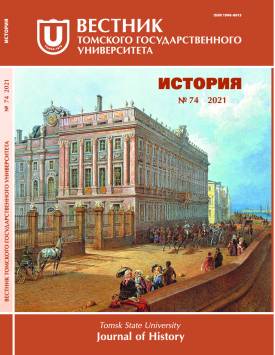Regional identity as a factor in the formation of the cultural-historical and socio-territorial community
The article deals with the category of “regional identity”, its interpretation in Russian and foreign sources. P articular attention is paid to the quantitative and qualitative characteristics of an individual who is aware of his belonging to a certain territory and forming the image of a “small homeland” in his mind. The content of the article states that modern Russian researchers interpret regional identity differently. Some researchers by regional identity understand the system of cultural relations, which are associated with the concept of “small homeland” or the relation of an individual to his small homeland, to the land on which he was born or lives and works. Others represent regional identity as the main factor influencing the development of the region. This influence is based on the individual’s awareness of himself as a subject of the regional community, respect and love for a particular region, pride in him, an understanding of his responsibility for his development and the ability to influence this process based on the awareness and self-assessment of the prospects for effective self-realization in a given territory. The author believes that regional identity mainly belongs to the in-country level, and delimits the political space between the subjects of the Russian Federation. The author notes that regional identity is associated with the development of the subnational space, with its economic, social and political characteristics. Regional identity serves as a link, since this phenomenon unites the moods and interests of social groups, regardless of social origin or ethnicity. According to the author, regional identity is inextricably linked with ethnicity and is the main factor in the formation of the cultural-historical and socio-territorial community. In the process of research, the author came to the following conclusions: - regional identity is formed on the basis of common territory, a certain system of values, features of the economic life of each individual spatial region. Regional identity mainly refers to the in-country level and delimits the political space between the subjects of the Russian Federation; - regional identity must be understood from the point of view of a systems approach, as this category is a system of cultural relations and values (religion, culture and language) associated with a particular territorial area; - the common identity and individuality of the territory, the formation of a common system of social and cultural values of social groups living in a particular region with its historical, political, economic and cultural characteristics affect the regional identity; - ethnic identity is one of the most important components in building a socio-territorial community. The ethnic federative model is organized according to the ethno-territorial principle, i.e. Federation subjects coincide with the boundaries of the habitats of certain ethnic groups.
Keywords
regional identity, ethnic identity, identification, ethnicity, territorial autonomyAuthors
| Name | Organization | |
| Tsvetkova Olga V. | Lomonosov Moscow State University | tsvetkovaov@mail.ru |
References

Regional identity as a factor in the formation of the cultural-historical and socio-territorial community | Tomsk State University Journal of History. 2021. № 74. DOI: 10.17223/19988613/74/21
